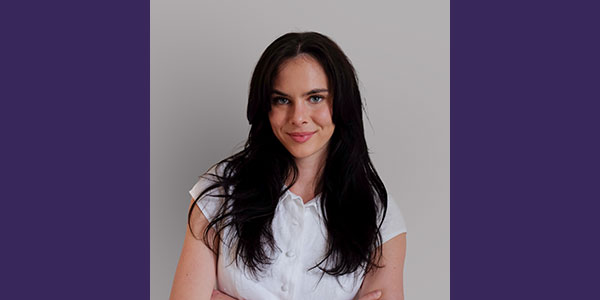Georgia Witchel and the team at Louiza Labs has raised $5 million in capital to develop the technology underlying simulated FDA trials and autonomous surgical robots.
Harvey Mudd College, the tiny science- and technology-focused school in Claremont, California, is certainly well-regarded. Georgia Witchel got in as a high school dropout. This was after an appearance at the Junior Olympics and four years competing around the world as a professional ice climber. Before starting Louiza, Witchel also became an avalanche-certified EMT, did a stint as an engineer at an Italian sportstech startup, and headed to the UW’s Master of Applied Bioengineering (MAB) program.
All by the time she was 22.
“When I entered MAB, I never really considered doing anything other than starting a company,” Witchel said. “When you’re young, you can generally afford a higher risk tolerance, and so I was kind of like…let’s swing for the fences.”
She incorporated her startup, Louiza Labs, just three months after graduating from the master’s program in May 2025. The company specializes in creating digital humans that can replace the current use cases’ reliance on real humans, accelerating development timelines by more 95 times. They plan to hit two primary markets in the next year. The first is simulated FDA trials for medical implants and devices, and the second is developing training protocols for autonomous surgical robotics.
“There are autonomous robots in every area – autonomous cars, even autonomous planes – but there are no autonomous surgical robots,” she said.
The problem is that autonomous robots are trained on huge amounts of data, and there isn’t enough medical data out there to do that. What exists is either outdated or fails to cover diverse patient groups. We think we found a workaround for this: synthetic medical data, Georgia Witchel
The company’s “physics engine” handles the hardcore computational simulations of human biology and anatomy, generating unique and anatomically accurate biomedical data. Witchel is responsible for the physics engine’s design as the company’s founder and CEO.
Witchel spent the summer of 2025 as part of Y Combinator. (They turned down Techstars, another big-name accelerator program from technology companies.) The company raised more than $4 million during its three months as part of the startup accelerator and has raised more than $5 million total.
Ultimately, Louiza intends to design and market an autonomous emergency surgical robot of their own with their physics engine at its heart – or, perhaps more appropriately, as its mind. The ability to complete six surgical stitches autonomously is currently considered the gold standard for medical robots. Louiza aims to complete 10 times that number of stitches within the next couple of years. The company hopes to revolutionize cleft-palate reconstructive surgery someday, improving what is often delayed or inadequate care, with its robots.
Witchel credits UW Bioengineering’s MAB program with contributing to the company’s breakneck success.
“I would not have been here without that experience,” she said. “The MAB is so oriented to the entrepreneur, and I’m so deeply grateful for that. It’s an incredible community that gave me the time and space to develop an idea.”
Affiliate Professor Dean Pettit and Professor Pat Boyle were exceptionally supportive members of that community, according to Witchel, as was Professor Katie Liu of UW’s School of Medicine. Dr. Hilliard Brydges, now a plastic surgery resident, worked closely with Witchel while conceiving the company and product. Despite being a surgical intern at the time, he was “with me on this every weekend. He was instrumental in getting this off the ground.”
The MAB is so oriented to the entrepreneur, and I’m so deeply grateful for that. It’s an incredible community that gave me the time and space to develop an idea, Georgia Witchel
“[The MAB program] is the first place I’ve been where it wasn’t a zero-sum game,” Witchel said, “where I felt like my peers really wanted everyone to succeed.”



